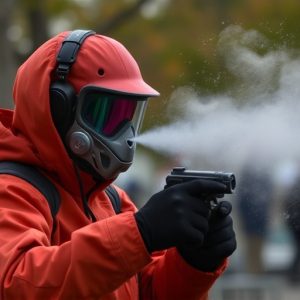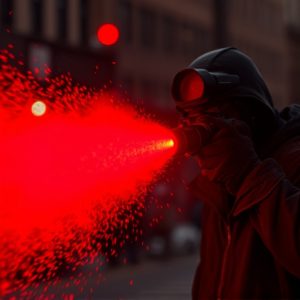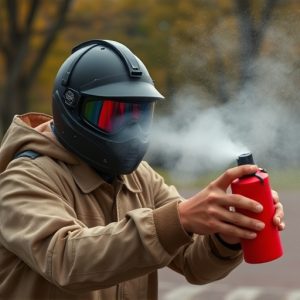Decoding OC Spray: Science, Vision Impact, and Legal Use for Self-Defense
Ocular capsaicin spray, commonly known as pepper spray, is a non-lethal self-defense tool that temp…….
Ocular capsaicin spray, commonly known as pepper spray, is a non-lethal self-defense tool that temporarily incapacitates an attacker by causing intense irritation upon contact with the eyes or skin. The main ingredient, oleoresin capsaicin, rapidly affects mucous membranes and eyes when deployed, spreading up to 10-30 feet depending on the formulation and conditions. It causes a burning sensation and uncontrollable lacrimation, leading to significant visual impairment but not actual blindness. The effects subside with water irrigation, restoring vision. While pepper spray can temporarily render an individual functionally blind, it does not cause permanent vision loss. Understanding its impact on vision, particularly addressing the question "Can pepper spray blind you?" is crucial for users who should be well-informed about its capabilities and limitations. It's important to note that the use of pepper spray is subject to legal regulations that vary by jurisdiction, dictating who can possess and use it, as well as the specific types and amounts allowed. Training in the proper use of OC spray ensures its effective application as a temporary deterrent rather than a complete solution for self-defense, and helps prevent accidental injury from the spray contacting one's own or others' eyes. Responsible use, adherence to legal guidelines, and understanding the potential effects on vision are essential for safe and legal self-defense with pepper spray.
OC spray, commonly known as pepper spray, is a potent self-defense tool that has gained widespread use for its effectiveness in deterring attackers. This article delves into the mechanics of OC spray, exploring its scientific basis and its profound impact on human vision. We examine whether it can indeed induce temporary blindness, assessing its safety and efficacy in self-defense scenarios. Additionally, we navigate the legal frameworks that govern its use, ensuring readers understand the importance of compliance and responsible handling. By providing best practices for training and precautions to avoid misuse, this article empowers individuals to make informed decisions about incorporating OC spray into their personal safety strategies.
Understanding OC Spray: The Science Behind Pepper Spray and Its Impact on Vision
Ocular capsaicin spray, commonly referred to as pepper spray, is a non-lethal self-defense tool that can incapacitate an assailant. The primary active component in pepper spray is oleoresin capsaicin, derived from chili peppers. This substance causes a strong irritation upon contact with the eyes, skin, and respiratory tract of an attacker. When pepper spray is deployed, the fine particles containing capsaicin become airborne and can reach the eyes at distances up to 10-30 feet, depending on the formulation and wind conditions.
The impact of pepper spray on vision is profound and immediate due to its effect on the sensory receptors in the eyes. Upon exposure, capsaicin binds to the TRVP1 receptor in the sensory neurons responsible for detecting heat and pain. This binding triggers a cascade of neural responses that result in an intense burning sensation and uncontrollable tearing, which can temporarily blind the individual. The eyes attempt to flush out the irritant, leading to extreme discomfort and reduced visibility, making it difficult for the attacker to see or continue their assault. This temporary vision loss allows time for the individual under threat to escape to safety. It’s important to understand that while pepper spray can cause significant incapacitation, it is not designed to permanently blind someone; its effects are reversible upon washing the affected areas with water. Understanding these scientific principles and the capabilities of OC spray is crucial for anyone considering it as a personal defense mechanism.
The Effects of OC Spray on Human Vision: Can It Cause Temporary Blindness?
Ocular capsaicin spray, commonly referred to as OC (Oleoresin Capsaicin) spray, is a non-lethal self-defense tool known for its intense irritant properties. When deployed, it can cause immediate and severe eye pain, leading to involuntary closure of the eyelids due to the capsaicin’s impact on the trigeminal nerves. This reaction can be mistaken for temporary blindness, as the intense burning sensation and light sensitivity significantly impair vision. It’s crucial to understand that while OC spray does not literally cause blindness, it can temporarily render a person incapable of effectively using their vision to see details or respond to visual stimuli. The effects are disorienting and can last for several minutes, giving the sprayed individual time to escape or comply with the user’s demands. Can pepper spray blind you? While it does not cause permanent loss of sight, the intense irritation caused by the spray can temporarily impair vision to a degree that may be likened to blindness in terms of functionality during the duration of the effects. It’s important for users and bystanders alike to recognize the potential visual impact of OC spray and handle it with caution, as the consequences can be more severe than initially perceived.
Evaluating the Safety and Efficacy of OC Spray in Self-Defense Situations
OC (Oleoresin Capsicum) spray, commonly known as pepper spray, is a non-lethal self-defense tool that has gained popularity due to its accessibility and ease of use. When evaluating the safety and efficacy of OC spray in self-defense scenarios, it’s crucial to consider the product’s strength, delivery system, and the individual’s ability to deploy it effectively under pressure. OC sprays are formulated to temporarily incapacitate an attacker by causing intense irritation to the eyes, respiratory tract, and skin. The potency of the spray can vary, with some formulations designed to reach a target up to 10-30 feet away, allowing for a safe distance between you and the threat. Questions about its safety arise, particularly regarding the potential to cause permanent harm, such as blindness. It’s important to note that while powerful, OC spray is not intended to permanently damage an attacker but rather to provide a window of opportunity for escape or for law enforcement to intervene. High-quality OC sprays are formulated with a precise concentration that ensures they are potent enough to be effective yet safe when used correctly. Users should always follow local regulations and training guidelines to ensure proper use, which can mitigate the risk of misuse or accidental exposure. Additionally, when considering the efficacy of OC spray, it’s essential to recognize its role in a broader self-defense strategy that includes awareness, avoidance, and physical self-defense techniques. Understanding the legal implications and limitations of using pepper spray is also vital, as laws differ by jurisdiction. In summary, OC spray can be a reliable component of personal safety measures when used responsibly, understanding its capabilities and limitations in self-defense situations.
Legal Considerations and Regulations Governing the Use of Pepper Spray
In various jurisdictions, the use of pepper spray is subject to strict legal frameworks designed to balance personal safety with public order and individual rights. It’s imperative for users to understand that while pepper spray is a non-lethal self-defense tool, its deployment must align with local laws and regulations. For instance, some regions may restrict the purchase, carrying, and use of pepper sprays based on their formulation, capacity, or to individuals who are authorized personnel such as law enforcement officers or security guards. A critical aspect of the legal considerations surrounding pepper spray is its potential impact on an assailant’s vision. Concerns about whether can pepper spray blind you are frequently raised, and it’s essential to clarify that while direct exposure to the spray can cause significant irritation and temporary impairment to vision, it does not result in permanent blindness. The effects are typically short-lived, with most individuals recovering their full vision capabilities after proper medical treatment and once the effects of the pepper spray have subsided. Users must be aware of the limits of this defense mechanism; while it can incapacitate an attacker temporarily, it is not a substitute for escaping a dangerous situation as quickly as possible. Adherence to the laws and regulations governing the use of pepper spray is crucial to ensure legal protection in self-defense scenarios and to avoid misuse or unintended consequences. Always consult local statutes or legal advisors to understand the full scope of permissible use and to stay compliant with the law.
Best Practices for Using OC Spray: Training, Precautions, and Avoiding Misuse
When utilizing OC (Oleoresin Capsicum) spray, a key best practice is to engage in regular training with the device to ensure familiarity and proficiency during an actual emergency. Consistent practice helps users understand the spray’s range, effectiveness, and proper aiming, which can be critical in preventing over-spray or missing the target. It’s also important to recognize the limitations of OC spray; while it is effective at deterring attackers by causing temporary inflammation of the eyes, respiratory system, and skin, it is not a substitute for escape. Training sessions should include scenarios that mimic potential confrontations, enabling users to react swiftly and appropriately when faced with aggression or threats.
In terms of precautions, it’s crucial to handle OC spray responsibly. Users must be aware of the potential for accidental blindness from can pepper spray if not used correctly, as the powerful irritants can affect anyone within the spray’s path, including bystanders and oneself. Therefore, users should always follow manufacturer guidelines, avoid spraying in enclosed or crowded areas, and practice proper ventilation during training. Precautions also extend to storing the spray in a secure manner to prevent unauthorized access, as misuse can lead to severe legal consequences. Regular maintenance of the OC spray, checking for can integrity, and understanding the expiration date are additional measures that ensure the device functions correctly when needed most. By adhering to these best practices, individuals can effectively use OC spray as a non-lethal self-defense tool while minimizing risks and misuse.


